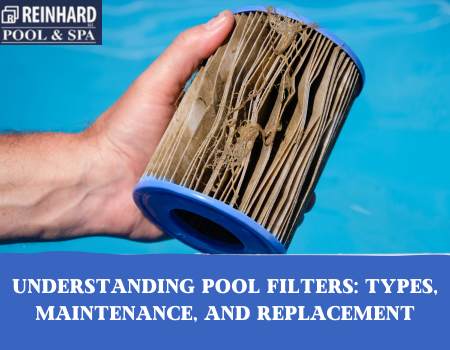Pool filters play a crucial role in maintaining clean and clear pool water by removing debris, dirt, and impurities. Understanding the different types of pool filters, as well as proper maintenance and replacement practices, is essential for ensuring optimal filtration and water quality. Whether you’re a new pool owner or looking to upgrade your filtration system, this guide will provide valuable insights into understanding pool filters.
Types of Pool Filters:
There are three main types of pool filters commonly used in residential pools: sand filters, cartridge filters, and diatomaceous earth (DE) filters. Each type has its own unique characteristics and advantages.
 Sand Filters: They feature a tank filled with special filter sand, which traps debris and particles as water passes through. Sand filters are relatively low maintenance and easy to operate, making them a popular choice for many pool owners. However, they may require backwashing periodically to clean the sand and maintain proper filtration efficiency.
Sand Filters: They feature a tank filled with special filter sand, which traps debris and particles as water passes through. Sand filters are relatively low maintenance and easy to operate, making them a popular choice for many pool owners. However, they may require backwashing periodically to clean the sand and maintain proper filtration efficiency.
- Cartridge Filters: Cartridge filters consist of a pleated cartridge element made of polyester or other durable materials. As water flows through the cartridge, debris and particles are trapped, allowing clean water to pass through. Cartridge filters offer excellent filtration efficiency and require less frequent maintenance compared to sand filters. They are also more energy-efficient and environmentally friendly, as they do not require backwashing.
- Diatomaceous Earth (DE) Filters: DE filters utilize a fine powder made from fossilized diatoms as the filter medium. The DE powder coats a series of grids or fingers inside the filter tank, forming a fine layer that traps even the smallest particles and impurities. DE filters provide superior filtration performance and water clarity, making them ideal for pool owners who prioritize pristine water quality. However, DE filters require regular maintenance, including backwashing and recharging with fresh DE powder.
Maintenance of Pool Filters:
Proper maintenance is essential for ensuring optimal performance and longevity of pool filters. Regardless of the type of filter you have, here are some general maintenance tips to follow:
- Regular Cleaning: Clean your pool filter regularly to prevent debris buildup and maintain filtration efficiency. For sand filters, backwash the filter as needed to flush out trapped debris and rejuvenate the filter sand. For cartridge filters, remove and rinse the cartridge with a garden hose to remove dirt and debris. For DE filters, backwash the filter to remove accumulated debris and recharge with fresh DE powder as needed.
- Monitor Pressure Gauges: Most pool filters are equipped with pressure gauges that indicate when it’s time to clean or backwash the filter. Monitor the pressure gauge regularly and clean or backwash the filter when the pressure exceeds the recommended range. Ignoring high filter pressure can lead to reduced filtration efficiency and potential damage to the filter.
- Inspect and Replace Components: Periodically inspect the filter tank, O-rings, seals, and other components for signs of wear or damage. Replace worn or damaged parts promptly to prevent leaks and ensure proper filter operation. Additionally, check for any cracks or leaks in the filter tank and repair or replace the filter if necessary.
- Professional Service: Consider scheduling regular professional maintenance and service for your pool filter. Professional technicians, such as those at Reinhard Pool Service, have the expertise and tools to perform thorough inspections, cleanings, and repairs to keep your pool filter in optimal condition.
When to Replace Pool Filters:
Despite regular maintenance, pool filters will eventually reach the end of their lifespan and require replacement. Here are some signs that it’s time to replace your pool filter:
- Reduced Filtration Efficiency: If you notice a decline in water clarity or an increase in debris and particles in your pool water, it may indicate that your filter is no longer effectively trapping contaminants. Inefficient filtration can result from clogged or worn filter media and is a clear sign that it’s time for a replacement.
- Excessive Wear or Damage: Inspect your pool filter regularly for signs of wear, corrosion, or damage. Cracks, leaks, or other visible damage to the filter tank, O-rings, or components may indicate that the filter is no longer functioning correctly and needs to be replaced.
- Persistent Pressure Issues:If your pool filter consistently exhibits high pressure readings, even after cleaning or backwashing, it may indicate underlying issues such as clogged or damaged filter media. Persistent pressure issues can affect filtration performance and may necessitate filter replacement.
- Age of the Filter: Pool filters have a limited lifespan, typically ranging from five to ten years depending on the type of filter and usage. If your filter is nearing or past its expected lifespan, it’s wise to consider replacing it to ensure optimal performance and water quality.
Understanding pool filters and implementing proper maintenance practices is essential for maintaining clean, clear, and healthy pool water. Whether you have a sand filter, cartridge filter, or DE filter, regular cleaning, monitoring, and inspection are key to maximizing filtration efficiency and prolonging the lifespan of your filter. If you’re in need of professional pool filter maintenance, repair, or replacement services, consider reaching out to Reinhard Pool Service. With their expertise and dedication to customer satisfaction, Reinhard Pool Service can help you keep your pool filter in optimal condition for years to come. For more information, contact us today and discover how you can ensure maximum efficiency and performance from your pool filter.
